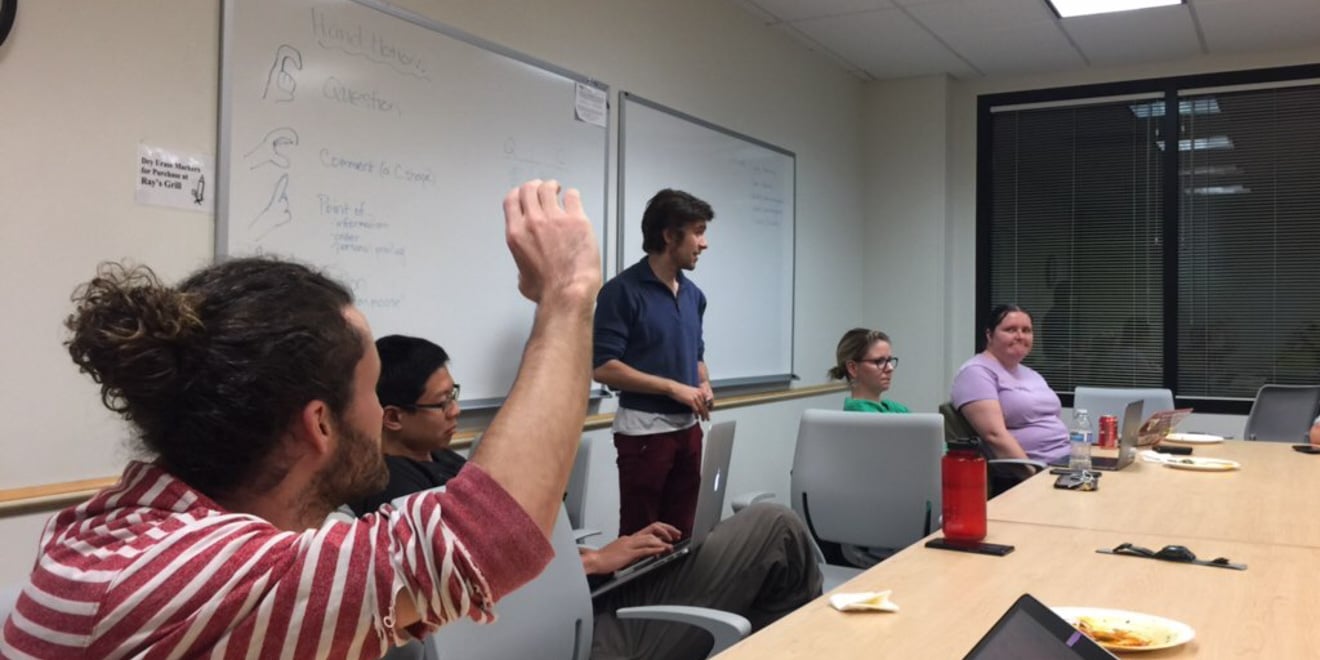In its weekly meeting on Wednesday night, the Graduate Student Council (GSC) addressed issues surrounding the Campus Climate Survey, KZSU’s complaint over its funding and graduate students’ healthcare issues.
Survey committee
Brian Cook, the Director of Assessment and Program Evaluation, asked the GSC for its thoughts as the Campus Climate Survey (CCS) Committee considers a recommendation to the Provost. As of Wednesday evening, the committee had not made a recommendation.
Emma Tsurkov J.S.M. ’15, a Ph.D. candidate in sociology, informed the council of several problems with the previous Campus Climate Survey administered in 2015, as discussed last night in an Associated Students of Stanford University (ASSU) meeting. According to Tsurkov, the survey failed to collect data on individuals’ inability to consent due to incapacitation from drugs or alcohol and failed to differentiate between “sexual misconduct” and “sexual assault.”
Cook also observed that trust is a big issue for student groups.
“The trust between the administration and the students is broken,” Cook said.
Instead of re-administering the CCS this spring, the GSC followed the ASSU in advocating for a survey designed by the Association of American Universities (AAU), which would be administered next spring.
Stephanie Pham ’18, a leader of the Stanford Association of Students for Sexual Assault Prevention (ASAP), argued that given the wide student support for the AAU survey, University follow-through would help to rebuild the trust between students and administrators.
KZSU dispute
In a 6 to 1 vote, the GSC also approved funding the campus radio station, with 60 percent of the costs covered by undergraduate student fees and 40 percent covered by graduate students. The decision to fund the group will be presented to each body in the ASSU election this spring.
Should both undergraduates and graduates approve the KZSU funding, the group would receive around $98,000 for equipment, labor, travel and more.
In last night’s Undergraduate Senate meeting, KZSU general manager Caleb Smith ’17 M.A. ’18 contested the 60-40 split, saying that the Undergraduate Senate violated an ASSU Constitutional provision requiring that representatives publicly post meeting times. Smith announced he will pursue a Constitutional Council suit against the group.
Smith also said that but for the Senate’s failure to post multiple meeting times, he would have been able to make his case against the apportionment split.
During the Undergraduate Senate meeting, appropriations committee chair Gabe Rosen ’19 speculated that Smith complained about the apportionment decision because Smith thinks the graduate community–whose voice is now weighted more heavily in deciding KZSU’s funding– is apt to vote against funding the organization, perhaps increasing the organization’s chance of losing money.
“Caleb in his personal opinion thinks that [the apportionment split is] unfair because he’ll lose an undergraduate portion and he wants to make sure that the undergrads take on more of the burden for KZSU,” Rosen said.
Healthcare
Isa Rosa and Melanie Malinas, members of the GSC’s funding committee, discussed the University’s student healthcare policies for the coming academic year.
According to Rosa and Malinas, Stanford is expected to raise the premium of Cardinal Care by 6 to 9 percent, while also raising the cost of deductibles.
They proposed writing a letter to advise against raising deductible rates, since this would make some medical procedures less accessible to students, a proposal which was unanimously supported by the GSC.
The GSC also followed up on last week’s discussion about the creation of a dog-run to benefit graduate students with service animals. However, recent problems have complicated the proposal.
“Students have been bitten or scratched by support animals,” said Gabby Badica, social chair of the GSC.
Another challenge is that the dog-run would require support from the Office of Accessible Education and R&DE.
The GSC unanimously supported the creation of a task force to address the concerns of students, while still moving forward with the dog-run.
The GSC also approved funding for the upcoming Chinese Lantern Festival hosted by the Chinese Women’s Collective and Hinamatsuri hosted by the Stanford Japanese Association.
Contact Elias Mooring at eliasm ‘at’ stanford.edu.
